|
|
|
Sort Order |
|
|
|
Items / Page
|
|
|
|
|
|
|
| Srl | Item |
| 1 |
ID:
186633
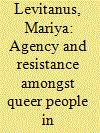

|
|
|
|
|
| Summary/Abstract |
This article focuses on the everyday lives of queer people in Kazakhstan, exploring how they express agentic power and negotiate their queer identity. This research is based on a Foucauldian-informed narrative analysis of in-depth interviews with 11 people who identify as queer and live in Kazakhstan. Findings show that the choice and ability to regulate one’s visibility are crucial expressions of queer agency and resistance. This paper expands on previously published research on gender and sexuality in Central Asia by focusing beyond the issues of violation of human rights and the difficult experiences of queer people, by considering instances of acceptance, support and positive experiences alongside experiences of homophobia, transphobia and discrimination.
|
|
|
|
|
|
|
|
|
|
|
|
|
|
|
|
| 2 |
ID:
191705
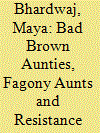

|
|
|
|
|
| Summary/Abstract |
This article offers an urgent complement to the trope of the South Asian aunty as an agent of discipline, shame, heteropatriarchy and tradition by exploring the counter-archetype of the resistance aunty—the radical feminist aunty who holds down social movements—in the South Asian diaspora. This article centres a queer lens on transgressive and activist aunties, and analyses digital and in-person queerings of the aunty in contemporary social and cultural movements. Examining resistance aunties in the writing, performances, interviews and other digital and in-person cultural work of four queer South Asians in the US and the UK, this article asserts the aunty as a core agent of resistance. It develops the notion of the resistance aunty in conversation with activist aunting in Black American organising and scholarship, and locates the legacy of the resistance aunty in queer and trans movements in the Global South and in the diaspora. By applying a new theoretics of resistance auntyhood to studies of aunty labour, this article argues for the importance of queer activist aunties in nurturing and propelling transformative social movements.
|
|
|
|
|
|
|
|
|
|
|
|
|
|
|
|
| 3 |
ID:
189408
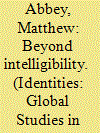

|
|
|
|
|
| Summary/Abstract |
This article explores the haunting aspects of queer migration within two documentary films: Season of Migration to the North (Laumann 2015), a film about a queer Sudanese migrant who fled to Norway after hosting a fashion show, and Shelter: Farewell to Eden (Masi 2019), a film about a Filipino transgender migrant navigating European borders. Instead of focusing on how the films make the protagonists intelligible, I focus on how absences are conjured to question the necessity of making the subject intelligible. This is important because queer migrants are often framed as only victims of persecution who must become intelligible to the demands of sexual humanitarianism. Disrupting the way visibility is heralded as an achievement for queer migrants, I explore the importance of unintelligibility in migration, especially when the terms of appearance are controlled by not only norms surrounding sexuality, gender, race, and class but also the violence of European borders.
|
|
|
|
|
|
|
|
|
|
|
|
|
|
|
|
| 4 |
ID:
161127
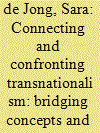

|
|
|
|
|
| Summary/Abstract |
This article traces the trajectory of transnationalism as a perspective and field of study and suggests that new impetus can be given to its development by establishing a dialogue between transnationalism and other key concepts. While the research agenda of the early stages was characterised by a need to distinguish transnationalism from related terms, such as globalisation, we argue that the field could now regain momentum by exploring synergies with other concepts. In this special issue we stage confrontations between transnationalism and, respectively, the (perspectives opened up by the) concepts of ‘borders’, ‘translocality’, ‘precarity’, ‘queer’, ‘moralities’, ‘the state’, and ‘brokerage’. Conceptually, this allows us to go beyond an internal critique that exposes the shortcomings of a transnational perspective, by suggesting novel frameworks and toolkits. Substantively, this issue’s articles demonstrate the need to refocus transnational studies’ attention to the unevenness, instability and inequality of transnational space.
|
|
|
|
|
|
|
|
|
|
|
|
|
|
|
|
| 5 |
ID:
171298
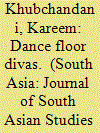

|
|
|
|
|
| Summary/Abstract |
Tracing his encounters with one particular song during fieldwork on queer nightlife in Bangalore, the author argues for the usefulness of ethnography as a critical method for studying dance and other modes of fun, play and pleasure in South Asia. He argues that ethnography’s many modes (co-performance, interview, observation, auto-ethnography) evidence how expressive practices integrate into the multiple strata of everyday life and political-economy, and how these cultural expressions facilitate inventions of new selves and worlds. While popular, improvised and social dances are challenging to study given their ephemerality, ethnography deepens our understanding of them and allows us to engage in creative dialogue in fieldwork.
|
|
|
|
|
|
|
|
|
|
|
|
|
|
|
|
| 6 |
ID:
173950
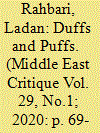

|
|
|
|
|
| Summary/Abstract |
In Iran, the politically sanctioned discourses of embodiment and body management are based on binary notions of gender and sexuality. These discourses are contested by social trends that reflect political dissent. This article uses a combination of content and visual analysis of three Instagram profiles dedicated to fashion to answer the question: ‘Is queer fashion present in Iranian cyberspace’ and if so, ‘How does it persist against the existing queer-phobic political forces?’ The article explores aesthetic and fashion categories called ‘duffs’ and ‘puffs’ that offer queer embodied extravaganza in Iranian cyberspace, which is a more relaxed geography of morality and leisure in comparison with offline public spaces. The analysis includes duffs and puffs’ life style and performance that entails excessive deployments of femininity and masculinity, and exploration of their political significance and potential to undo gender norms in Iran. While they do not explicitly reject heteronormativity and/or capitalism, their non-participation in the conventional modes of money-making, and their erotic and sexual performance contributes to transformative politics. They offer antagonism to the normative power of mainstream gender and sexual ideologies by staining their heterogeneity through performances of fun, shock and failure.
|
|
|
|
|
|
|
|
|
|
|
|
|
|
|
|
| 7 |
ID:
167386
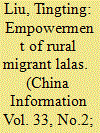

|
|
|
|
|
| Summary/Abstract |
In today’s China, women’s social roles continue to be rigidly associated with gender-based responsibilities that include defending the integrity of their family, entering into heteronormative marriage, and showing reproductive capabilities. Most of those who self-identify as lalas (lesbians) struggle with such issues as self-shaming emotions, disclosing their homosexuality to family members, friends, or colleagues, and dealing with family and social pressures. Within this context, I investigate queerness in a group of young Chinese rural migrant lalas working and living in the industrial area of the Pearl River Delta economic zone in South China. I draw two conclusions. First, rural-to-urban labour migration empowers rural female lalas by providing a measure of economic independence and an escape from patriarchal and homophobic family relations. Second, the integration of traditional (offline and face-to-face) socializing locations and emerging virtual communicative spaces plays an important role in the process through which possibilities of living a queer life are carved out.
|
|
|
|
|
|
|
|
|
|
|
|
|
|
|
|
| 8 |
ID:
157596
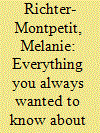

|
|
|
|
|
| Summary/Abstract |
Queer International Relations’ momentum in the past four years has made it inconceivable for disciplinary IR to make it ‘appear as if there is no Queer International Theory’. The ‘queer turn’ has given rise to vibrant research programmes across IR subfields. Queer research is not only not a frivolous distraction from the ‘hard’ issues of IR, but queer analytics crack open for investigation fundamental dimensions of international politics that have hitherto been missed, misunderstood or trivialised by mainstream and critical approaches to IR. As queer research is making significant inroads into IR theorising, a fault line has emerged in IR scholarship on sexuality and queerness. Reflecting the tensions between Lesbian, Gay, Bisexual and Transgender (LGBT) Studies and Queer Theory in the academy more broadly, the IR literature on (homo)sexuality largely coalesces into two distinct approaches: LGBT and Queer approaches. The article will lay out the basic tenets of Queer Theory and discuss how it diverges from LGBT Studies. The article then turns to the books under review and focuses on the ways in which they take up the most prominent issue in contemporary debates in Queer Theory: the increasing inclusion of LGBT people into international human rights regimes and liberal states and markets. The article finishes with a brief reflection on citation practices, queer methodologies and the ethics of queer research.
|
|
|
|
|
|
|
|
|
|
|
|
|
|
|
|
| 9 |
ID:
171301
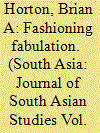

|
|
|
|
|
| Summary/Abstract |
India’s ongoing legal movement to decriminalise ‘gay sex’ has been witness to the simultaneous sanitisation of queer spaces. From Pride parades declaring ‘no nanga naach, no flamboyance’ to quotidian policing of excessive dress and gestures, there is a growing emphasis on respectability that stages queerness in the private rather than the public domain. The good homosexual subject is increasingly at odds with public gestures, performances and dresses that might seem too excessive, too flamboyant, perhaps too queer. But what might it mean to sit with the bawdy gestures enacted by kothi, hijra and MSM persons in Prides, in offices, in public spaces and in daily life? This essay makes a case for theorising the fabulousness of gender and sexual minorities in India, pushing homosexuality beyond the registers of legality and epidemiology. By examining the political implications of excessive and risky aesthetic practices, it argues that what is at stake is not only a centring of aesthetics in larger considerations of queer politics, but also the larger work of fabulation: the reinvention of what meanings queer subjectivity can take on in public spaces in India.
|
|
|
|
|
|
|
|
|
|
|
|
|
|
|
|
| 10 |
ID:
177943
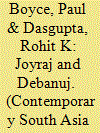

|
|
|
|
|
| Summary/Abstract |
In this article we want to evoke two characters that each suggest different points of departure for thinking about Kolkata as a queer kind of space. By this we want to evoke something of the sexual geography and life-ways of the city, but to go beyond this standpoint too, to question ways in which ethnographic characters might be evoked in respect of any context, Kolkata or elsewhere. In one sense this is to open out a perception of Kolkata as a scene of many sexual life-worlds, inviting a plural kind of analysis suggestive of a multiplicity of perspectives; persons/subjects each with a unique viewpoint to be captured. The two characters we explore here each draw attention to issues of belonging and migration, of both wanting to move to and away from Kolkata; creating new life-worlds via the city amidst its shifting sexual geographies, class and caste divisions, and wider diasporic connections and fault-lines. Kolkata itself emerges as an attribute of the characterisations to hand: sometimes as distinct mise-en-scene, at others a kind of sensibility or resonance field for understanding self and others.
|
|
|
|
|
|
|
|
|
|
|
|
|
|
|
|
| 11 |
ID:
105302


|
|
|
|
|
| Publication |
2011.
|
| Summary/Abstract |
Muslims in the U.S. are comparatively well-educated, economically indistinct from the rest of the population, with a set of attitudes broadly compatible with the political mainstream. One of the few issue areas on which they stand out as distinctly conservative is on homosexuality, where rates of "disapproval" are at the same level as among evangelical Protestants. This view is reflected in the positions taken by most organized Muslim groups in the U.S., and almost certainly by the vast majority of religious leaders. There are indications of Muslims adapting their faith to the western context, and to intergenerational change in attitudes to sexual diversity. However, increasing sensitivity among American Muslims to the distrust or disdain to which their faith is subject, and to the heightened sense of scrutiny that they experience, may well be contributing to a retention of selective moral traditionalism.
|
|
|
|
|
|
|
|
|
|
|
|
|
|
|
|
| 12 |
ID:
178251


|
|
|
|
|
| Summary/Abstract |
With a focus on contemporary South Africa, and through the lens of queer identity and politics, the article critiques the limitations and possibilities for queerness and its futures in post-apartheid South Africa. From the advent of constitutional democracy and its ushering in of human rights, the article analyses developments in the politics of sexuality in the context of enduring systems of violence, rooted in colonial and apartheid histories. Discrimination against lesbian, gay, bisexual, transgender and intersex people – at the intersection with other forms of discrimination – has emerged as a focal point for political resistances in the post-apartheid period. These resistances are interrogated, including the paradoxes of rights struggles that they expose, and the contradictions between formal equality gains and present queer realities that they call attention to. With an emphasis on enduring inequalities within post-apartheid society, and on the racialisation of violence against queerness, the article explores various political formations of and for queer freedom. In navigating these dynamics of inequality and difference, the article urges a radical politics – both for relating as equals, and against the violent ends of othering.
|
|
|
|
|
|
|
|
|
|
|
|
|
|
|
|
| 13 |
ID:
177714


|
|
|
|
|
| Summary/Abstract |
This article explores contemporary artistic practices in Kazakhstan that challenge narratives on national belonging and identity through the notion of queerness. It discusses artworks created by artists Saule Dyussenbina, Natalya Dyu and Kuanish Bazargaliyev, the artistic duo Kreolex Center, and the advertising agency Havas Worldwide Kazakhstan, which were created as a reaction to global discussions around gender and sexuality happening in and between various countries. It seeks to scrutinize different approaches and aspects presented in each artwork and argues that the overall strategy present in all the artistic testimonies is humour. While drawing on key concepts and categorizations of humour that permit the uncovering of the ways in which humour creates specific knowledge and identity, this article looks at humour techniques more broadly and builds on the argumentation provided by Uroš Čvoro and Chrisoula Lionis that opt for humour analysis connected to temporality and its perception in the works of art.
|
|
|
|
|
|
|
|
|
|
|
|
|
|
|
|
| 14 |
ID:
141135
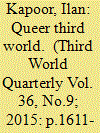

|
|
|
|
|
| Summary/Abstract |
This article attempts to align ‘queer’ and ‘Third World’ – grouping them in their common inheritance of subjugation and disparagement and their shared allegiance to non-alignment and a politics aimed at disrupting domination and the status quo. In assembling both terms one is struck by how, in the mainstream discourse of international development, the Third World comes off looking remarkably queer: under Western eyes it has often been constructed as perverse, abnormal and passive. Its sociocultural values and institutions are seen as deviantly strange – backward, effete, even effeminate. Its economic development is depicted as abnormal, always needing to emulate the West, yet never living up to the mark (‘emerging’ perhaps, but never quite arriving). For their part, postcolonial Third World nation-states have tended to disown and purge such queering – by denying their queerness; indeed often characterising it as a ‘Western import’ – yet at the same time imitating the West and pursuing neoliberal capitalist growth. I want not only to make the claim that the Western and Third World stances are two sides of the same discourse but, drawing on Lacanian queer theory, also to suggest that a ‘queer Third World’ would better transgress this discourse by embracing queerness as the site of structural negativity and destabilising politics.
|
|
|
|
|
|
|
|
|
|
|
|
|
|
|
|
| 15 |
ID:
173949


|
|
|
|
|
| Summary/Abstract |
Prior to the Syrian uprisings in 2011, Syrian queer and trans* populations were rather unknown and irrelevant to global LGBT politics, Western media, and humanitarian efforts. This changed considerably after the uprisings as representations steadily increased and proliferated on social media and in journalistic accounts. This article traces this shift and argues that queer and trans* Syrians became visible primarily through a queer/humanitarian media-visibility paradigm and the construction, consolidation, and circulation of the figure of the suffering Syrian gay refugee. Drawing on analyses of what I consider pivotal events and media representations as well as journalistic writings, this article maps out the ways in which the figure of the suffering Syrian gay refugee and the associations it foregrounds emerged, circulated, and became normalized after the uprisings and years into the Syrian conflict. Furthermore, based on ethnographic fieldwork that I conducted with Syrian LGBT refugees in Istanbul during 2014 – 15, this article challenges the suitability of this figure as a knowledge production framework and suggests new research trajectories to approach, understand, and write Syrian queer and trans* histories beyond the queer/humanitarian visibility paradigm and the figure of the suffering Syrian gay refugee.
|
|
|
|
|
|
|
|
|
|
|
|
|
|
|
|
| 16 |
ID:
187115


|
|
|
|
|
| Summary/Abstract |
Focusing on the case of ‘Gay Clown Putin’, this article theorizes memes as visual interventions in international politics. While not all memes are political interventions, Gay Clown Putin is an iconic meme that is part of the international response to Russian state-directed political homophobia that emerged after the gay propaganda law was passed in 2013. How it has circulated and the attention it has received make it apt for exploring memes as visual political interventions that challenge national security discourses. Here, I provide three readings of Gay Clown Putin that suggest different possibilities for how the meme might work politically. In so doing, I deepen international relations’ engagement with queer theory by bringing in the politics of play that works through a queer epistemology that embraces deviance. Bringing memes to the study of international security, I show how the collection of images making up the Gay Clown Putin meme provides space for understanding the visual politics of security.
|
|
|
|
|
|
|
|
|
|
|
|
|
|
|
|
| 17 |
ID:
161103
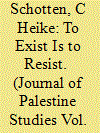

|
|
|
|
|
| Summary/Abstract |
This article provides an outline of the project of queer theory and the ways that this project has (and has not) engaged with the question of Palestine. Ultimately, the author argues that queer theory and Palestinian liberation share, albeit perhaps unwittingly, a defining resistance to elimination and an enduring commitment to unsettlement. As such, queer politics is and can surely become decolonial praxis, just as decolonization has a clear affinity with dissident queer resistance.
|
|
|
|
|
|
|
|
|
|
|
|
|
|
|
|
| 18 |
ID:
161129


|
|
|
|
|
| Summary/Abstract |
This article discusses the trajectories of the rainbow flag through the concept of transnationalism and sets up a theoretical exchange between transnational migration research, critical sexuality studies, and queer scholarship. By engaging with the analytical differentiation between transnational ‘ways of being’ and ‘ways of belonging’ this article reads these concepts through a queer lens, while also challenging some of their underlying assumptions. We are asking if, and in that case how, the rainbow flag can be regarded as a visible manifestation of transnational ways of queer being, and as a floating signifier filled with different meanings through quotidian acts and diverse and unequal queer ways of being – interlinked as it is with global hegemonies and colonial genealogies besides signifying local specificities – but nevertheless somehow indicating transnational ways of queer belonging to an imagined queer community.
|
|
|
|
|
|
|
|
|
|
|
|
|
|
|
|
| 19 |
ID:
189411


|
|
|
|
|
| Summary/Abstract |
This article explores how marriage animates the racial logic of the security state. While the pursuit of romantic love culminating in a wedding is considered to be a universal good, arranged marriages are viewed as a dangerous anachronism which threaten the state’s authority. By revealing the animating force of arranged marriage in the UK immigration regime and the War on Terror, we can see the central role of love marriage within the principles of choice, autonomy and individuality around which the liberal subject organises their moral economy. The legalisation of gay marriage – constructed as a kind of love marriagepar excellence – becomes the means through which the nation state can uphold this moral economy and be renewed and reinvigorated in the process. By putting gay marriage in dialogue with arranged marriage, the gendered and racial configuration of the UK as a security state becomes visible.
|
|
|
|
|
|
|
|
|
|
|
|
|
|
|
|
|
|
|
|
|